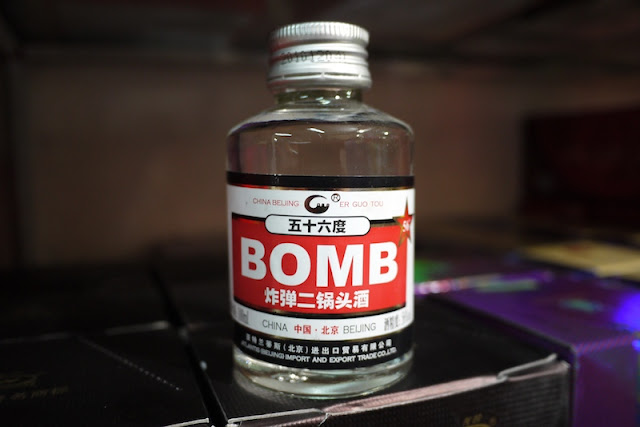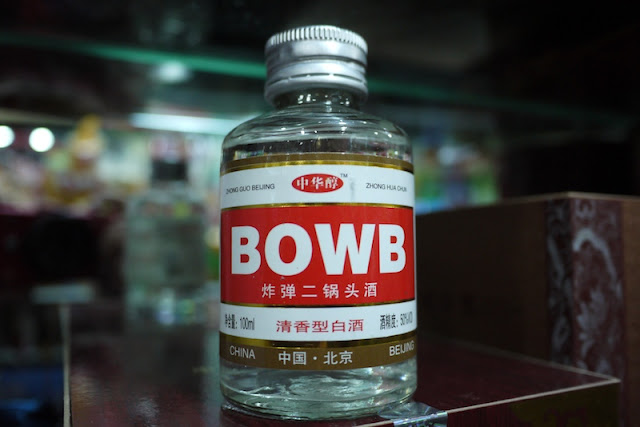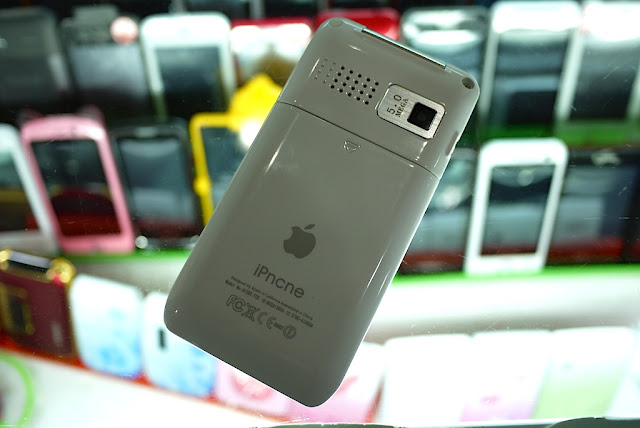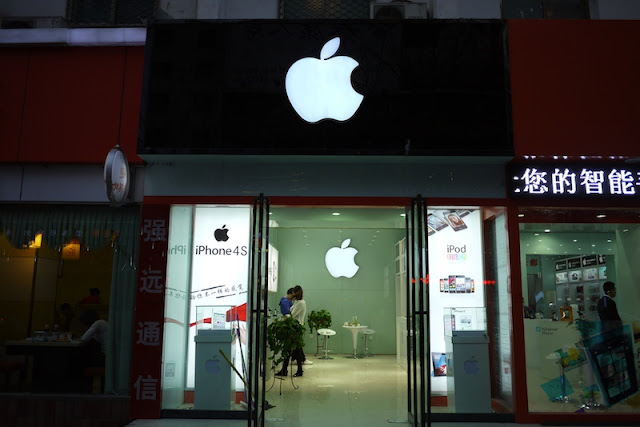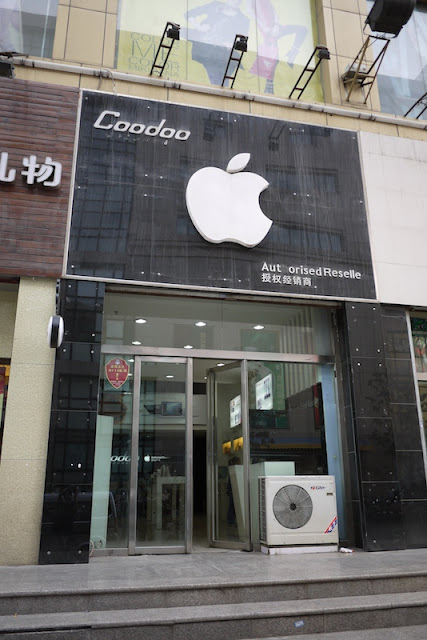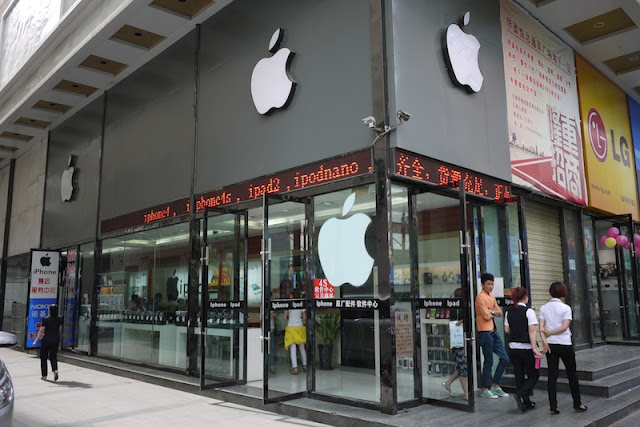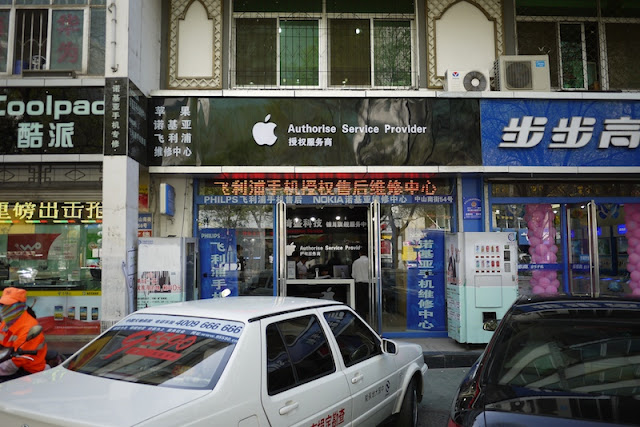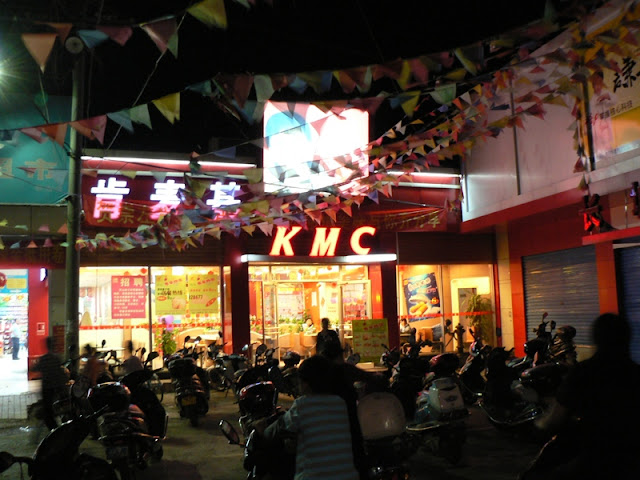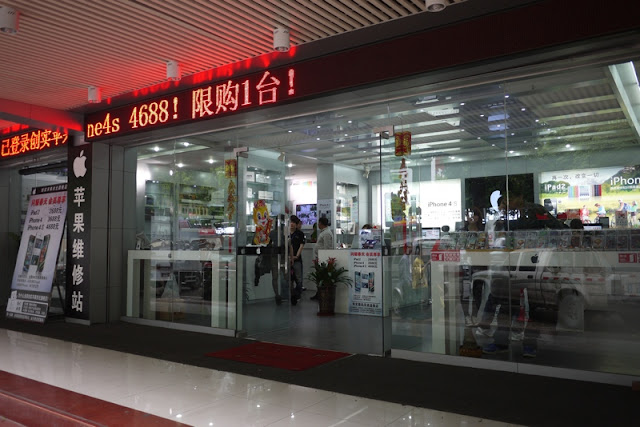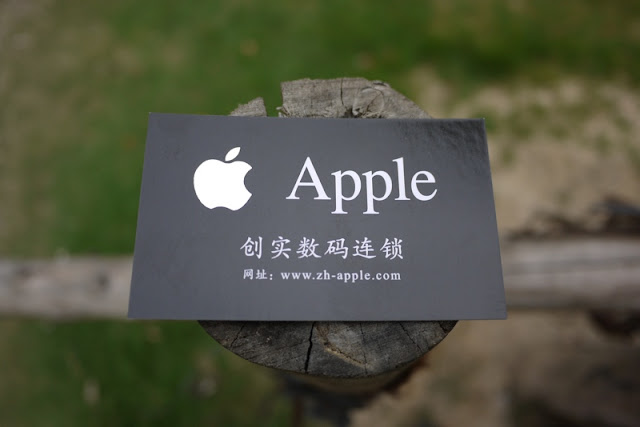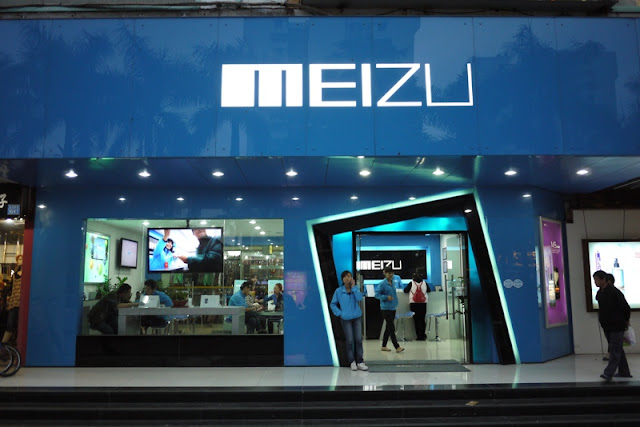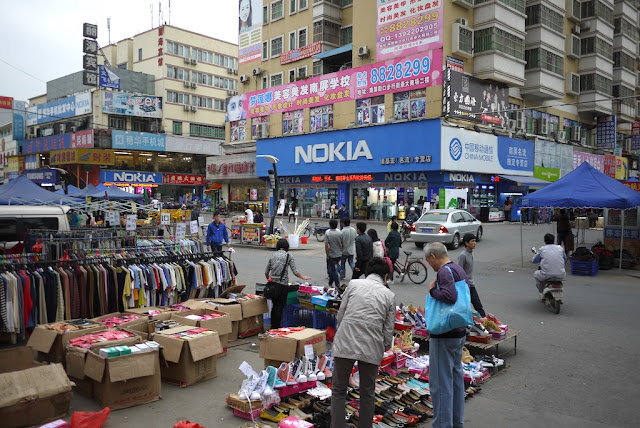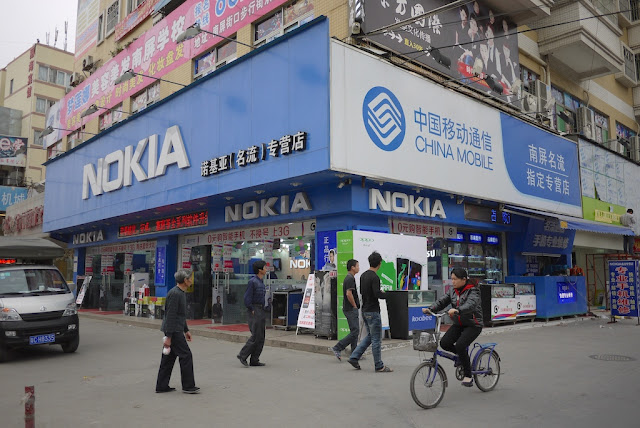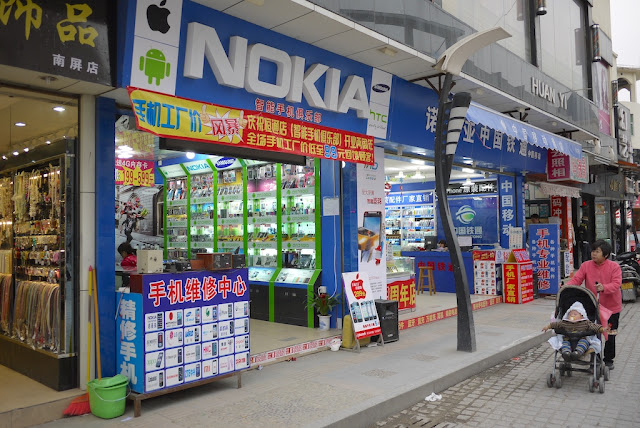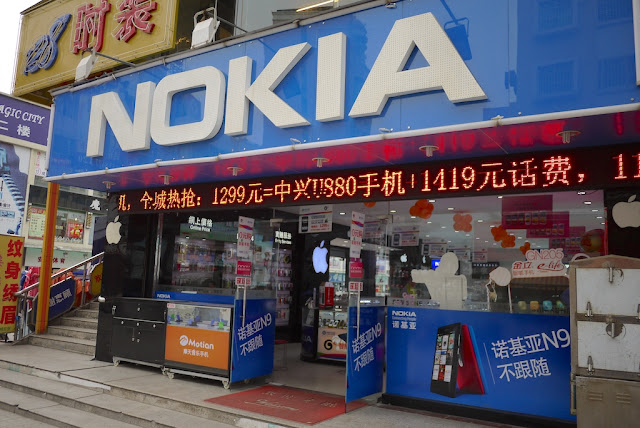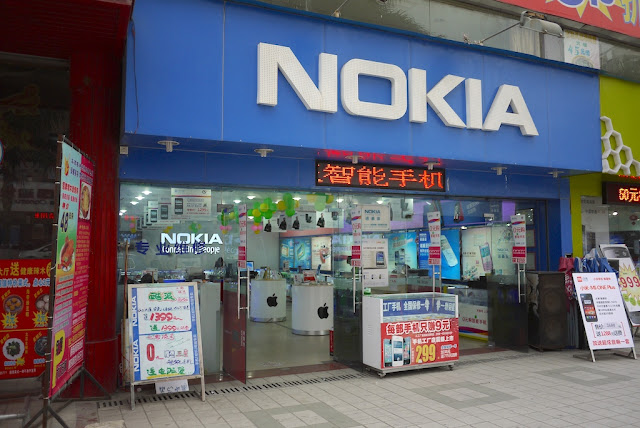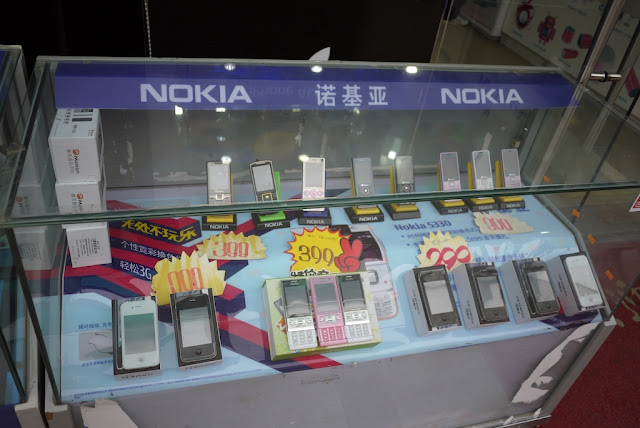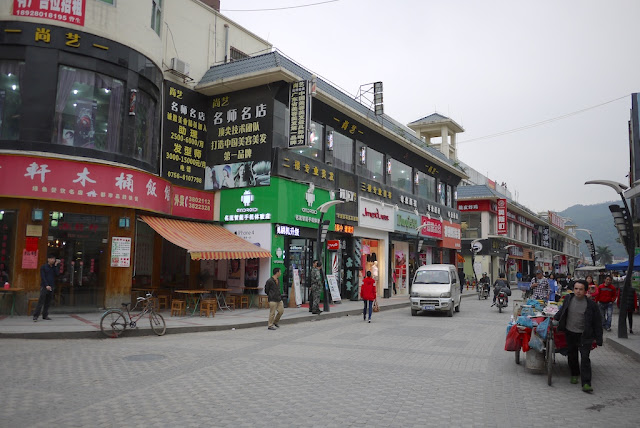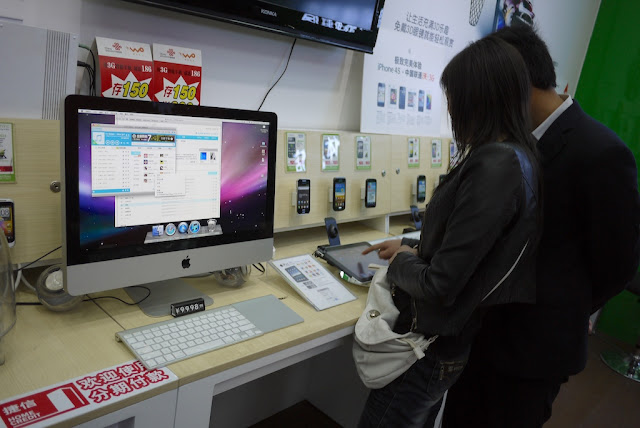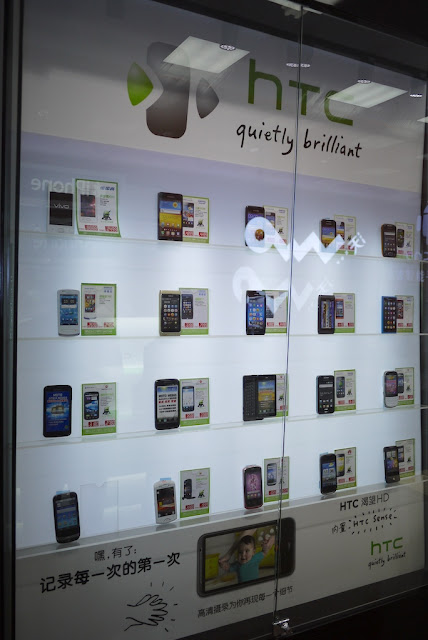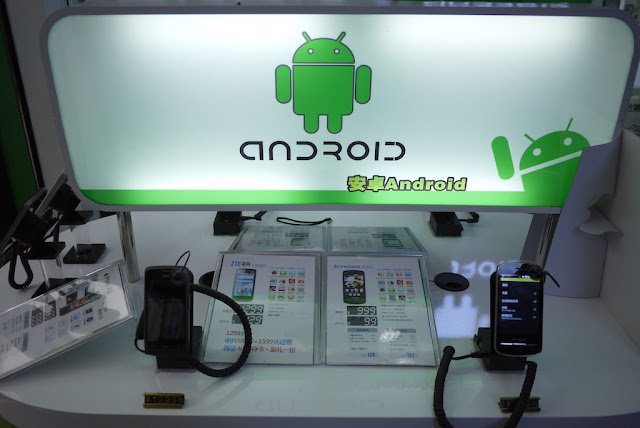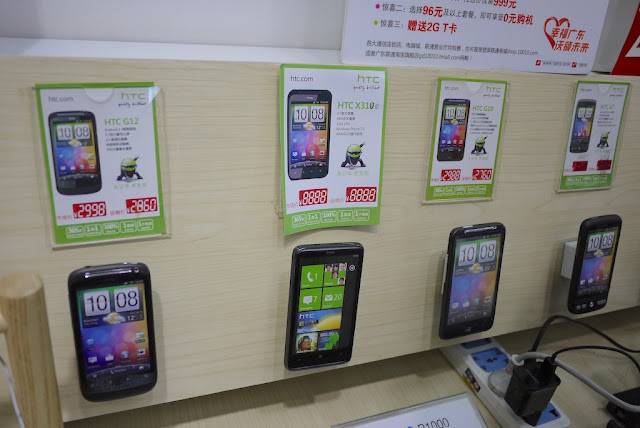[Update at end]
Companies such as Apple face challenges in China due to trademark infringement. Given Apple's large profits and relatively high-priced items, it may not seem surprising that some would try to copy or imitate it. But even products that could not be considered "luxury items" in China are not immune.
There are many possible examples illustrating this point, so I will share one that I recently encountered:
Beneath the word "BOMB" on the label of the 100ml bottle above is "炸弹二锅头酒" -- which translates to "Bomb Erguotou Liquor". Erguotou is a type of baijiu -- in a loose analogy baijiu is to China as what vodka is to Russia. Erguotou is typically quite strong and BOMB is 56% alcohol (112 proof). Erguotou is typically cheaper than other types of baijiu, and the above bottle cost me about US $1 in Xining, Qinghai province.
Before introducing some of its notable competitors to this made-in-Beijing alcohol, it is worth highlighting how BOMB is trying to appeal to a larger audience. Its website at www.bomb9.com (in Chinese "9" sounds like the word for alcohol -- jiu) is part of this attempt. My favorite item available there is a movie-advertisement that combines the spirit of the Terminator, Superman, and other themes. Given its length and the various cultural references included I will not even try to provide a translation (but if someone else does, I will be happy to link to it). I will say that my earlier series of posts beginning with "People Not Helping Accident Victims in China" provides some context for a scene involving an injured older woman. But even without any knowledge of Chinese language or culture, I think one can enjoy the video which I will share here (ironically, the ad may be preceded by an ad):
If the video has not convinced you it is worth splurging $1 on a bottle of BOMB, fear not. Its competitors provide options. Perhaps a bottle of BDWB would be a better choice since I found it for about 17 cents cheaper:
Although "SI HE YUAN BDWD" is written on the top left of the label, more prominently under the large BDWB is "四合院炸弹二锅头酒" which could be literally translated as "Courtyard Bomb Erguotou Liquor". Most relevant is that it uses the same Chinese word for "bomb" as BOMB. It also claims to be from Beijing, but it has a heftier alcohol percentage of 58%.
If the price is right, but the drink is too strong then maybe the equally priced BOWB would be a better choice:
The Chinese under BOWB, 炸弹二锅头酒, is an exact copy of the text on the BOMB bottle. But if a weaker liquor is preferable then it "only" having 50% alcohol might be more appealing.
I would not be surprised to later find other similar imitators of BOMB. But unlike the examples involving Apple, I am not sure these imitators could provide any inspiring insights for BOMB. Regardless, the point here is that whether you are selling products worth hundreds and thousands of dollars or you are selling products worth a single dollar, being imitated or copied should come as no surprise in China.
Needless to say, watching the video, writing this post, and my earlier challenges of the week have left me welcoming a proper drink. And that will serve me well for the critical step of taste testing the above drinks to see how they compare. Can the imitators match the quality of the original BOMB?
I'll start with BOMB to serve as the baseline and then try the other while providing some brief comments of my initial impressions. Before I lose the nerve (or gain my senses), here I go:
BOMB -- I think I see as many stars as if I were kicked by a Beijing donkey. I have heard baijiu described as tasting like rocket fuel but I am not sure. I have yet to drink rocket fuel. Anyways, I think this may be the most aptly named drink ever. However, I should say I have tasted worse drinks in China. And better...
BDWB -- Oh my. That certainly felt worse. I swear my eyes are watering. And I do not have words for the taste. And you should probably be thankful for that. I am not sure how I can proceed. But in the name of science I shall press forward even though I may meet a fate similar to that of Clarence Dally.
Here it goes.
OK. Really folks. Do I need to do this? The BDWB made me realize I have no clue what may be in this bottle. Heck, why should I believe even BOMB is any safer than "unusual" baby formula?
Oh yes, in honor of Clarence...
BOWB -- Hey... that honestly went down smoother than the BDWB. Maybe due to the lower alcohol percentage? But the aftertaste is rather peculiar. Maybe the mercury? It should be emphasized that I drank it after the other two drinks. The previous alcohol may be impacting my perceptions. Ideally, I should later try them in counterbalanced orders but... that is not going to happen. Clarence only needs so much honoring.
So my point here? I have forgotten it. I feel fortunate that I spent less than $3 on this entire demonstration. It certainly would have been more expensive if I had bought fake iPhones.
Oh yes. everything can be imitated. Even $1 bottles of BOMB erguotou.
UPDATE: To respond to some questions... No, I did not drink the the full contents of the bottles (or even come close). I was not interested in ingesting too much of whatever may be in the various liquids. I figured a one-time taste of a small amount would be unlikely to lead to any long-lasting ill effects. The worst part was the initial taste of the BDWB. I was absolutely fine later that night and the next morning.
Companies such as Apple face challenges in China due to trademark infringement. Given Apple's large profits and relatively high-priced items, it may not seem surprising that some would try to copy or imitate it. But even products that could not be considered "luxury items" in China are not immune.
There are many possible examples illustrating this point, so I will share one that I recently encountered:
Beneath the word "BOMB" on the label of the 100ml bottle above is "炸弹二锅头酒" -- which translates to "Bomb Erguotou Liquor". Erguotou is a type of baijiu -- in a loose analogy baijiu is to China as what vodka is to Russia. Erguotou is typically quite strong and BOMB is 56% alcohol (112 proof). Erguotou is typically cheaper than other types of baijiu, and the above bottle cost me about US $1 in Xining, Qinghai province.
Before introducing some of its notable competitors to this made-in-Beijing alcohol, it is worth highlighting how BOMB is trying to appeal to a larger audience. Its website at www.bomb9.com (in Chinese "9" sounds like the word for alcohol -- jiu) is part of this attempt. My favorite item available there is a movie-advertisement that combines the spirit of the Terminator, Superman, and other themes. Given its length and the various cultural references included I will not even try to provide a translation (but if someone else does, I will be happy to link to it). I will say that my earlier series of posts beginning with "People Not Helping Accident Victims in China" provides some context for a scene involving an injured older woman. But even without any knowledge of Chinese language or culture, I think one can enjoy the video which I will share here (ironically, the ad may be preceded by an ad):
If the video has not convinced you it is worth splurging $1 on a bottle of BOMB, fear not. Its competitors provide options. Perhaps a bottle of BDWB would be a better choice since I found it for about 17 cents cheaper:
Although "SI HE YUAN BDWD" is written on the top left of the label, more prominently under the large BDWB is "四合院炸弹二锅头酒" which could be literally translated as "Courtyard Bomb Erguotou Liquor". Most relevant is that it uses the same Chinese word for "bomb" as BOMB. It also claims to be from Beijing, but it has a heftier alcohol percentage of 58%.
If the price is right, but the drink is too strong then maybe the equally priced BOWB would be a better choice:
The Chinese under BOWB, 炸弹二锅头酒, is an exact copy of the text on the BOMB bottle. But if a weaker liquor is preferable then it "only" having 50% alcohol might be more appealing.
I would not be surprised to later find other similar imitators of BOMB. But unlike the examples involving Apple, I am not sure these imitators could provide any inspiring insights for BOMB. Regardless, the point here is that whether you are selling products worth hundreds and thousands of dollars or you are selling products worth a single dollar, being imitated or copied should come as no surprise in China.
Needless to say, watching the video, writing this post, and my earlier challenges of the week have left me welcoming a proper drink. And that will serve me well for the critical step of taste testing the above drinks to see how they compare. Can the imitators match the quality of the original BOMB?
I'll start with BOMB to serve as the baseline and then try the other while providing some brief comments of my initial impressions. Before I lose the nerve (or gain my senses), here I go:
BOMB -- I think I see as many stars as if I were kicked by a Beijing donkey. I have heard baijiu described as tasting like rocket fuel but I am not sure. I have yet to drink rocket fuel. Anyways, I think this may be the most aptly named drink ever. However, I should say I have tasted worse drinks in China. And better...
BDWB -- Oh my. That certainly felt worse. I swear my eyes are watering. And I do not have words for the taste. And you should probably be thankful for that. I am not sure how I can proceed. But in the name of science I shall press forward even though I may meet a fate similar to that of Clarence Dally.
Here it goes.
OK. Really folks. Do I need to do this? The BDWB made me realize I have no clue what may be in this bottle. Heck, why should I believe even BOMB is any safer than "unusual" baby formula?
Oh yes, in honor of Clarence...
BOWB -- Hey... that honestly went down smoother than the BDWB. Maybe due to the lower alcohol percentage? But the aftertaste is rather peculiar. Maybe the mercury? It should be emphasized that I drank it after the other two drinks. The previous alcohol may be impacting my perceptions. Ideally, I should later try them in counterbalanced orders but... that is not going to happen. Clarence only needs so much honoring.
So my point here? I have forgotten it. I feel fortunate that I spent less than $3 on this entire demonstration. It certainly would have been more expensive if I had bought fake iPhones.
Oh yes. everything can be imitated. Even $1 bottles of BOMB erguotou.
UPDATE: To respond to some questions... No, I did not drink the the full contents of the bottles (or even come close). I was not interested in ingesting too much of whatever may be in the various liquids. I figured a one-time taste of a small amount would be unlikely to lead to any long-lasting ill effects. The worst part was the initial taste of the BDWB. I was absolutely fine later that night and the next morning.

